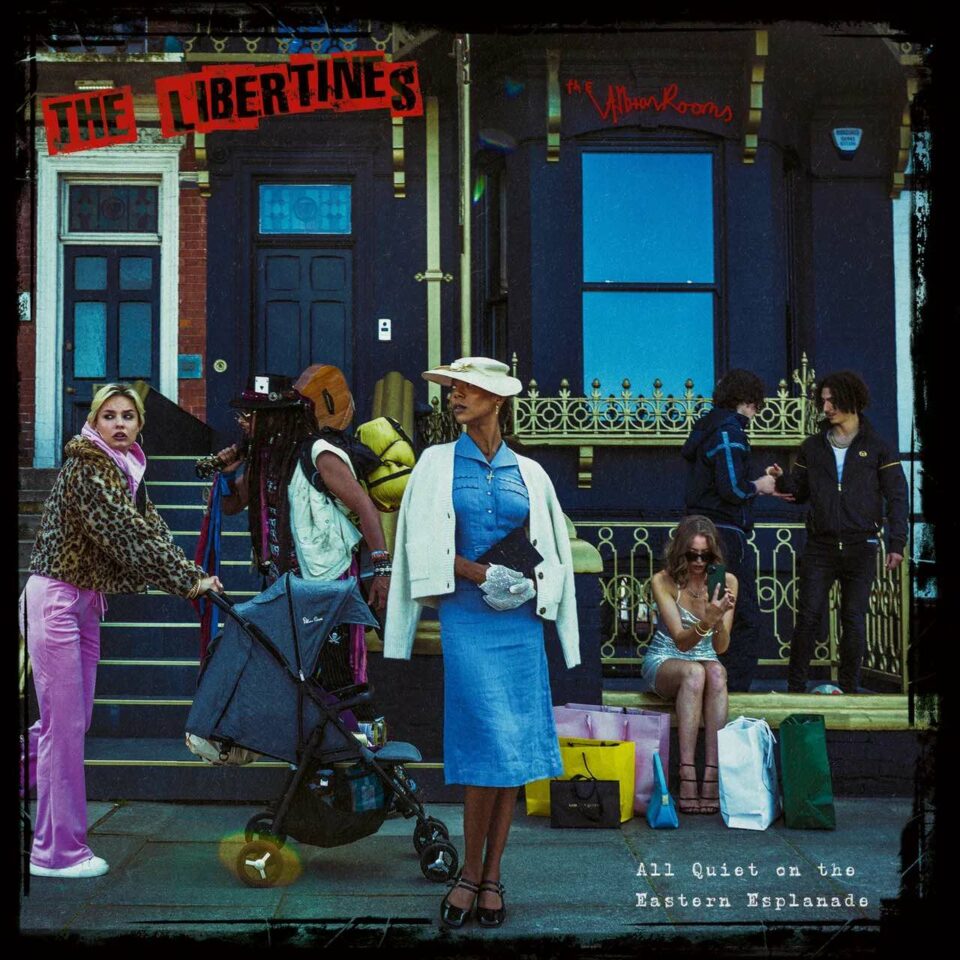Molly Rankin’s voice recorder captured her most promising ideas, no matter how raw. Until it was stolen. The recorder, which she speculates is currently “degrading in a sewer somewhere,” featured hours of ideas for what would become Blue Rev, the buoyant, shape-shifting third album from the Canadian songwriter’s band Alvvays. “I left the apartment for probably an hour and came back, and everything was upside down and the front door was open. It took me a while to realize my little hand recorder was gone,” Rankin explains over a Zoom call.
Initially, she downplays the impact: “Thankfully, the way that I write, I pursue something only if I can remember it. It was probably, like, 100 hours of me howling at the moon.” But she also hints at what may have been lost: “I have these little natural paths I go down that sometimes box you in as a writer. So some of the things in those recordings are just happy accidents and mistakes that will take you down a different path. And those are the things I’ll never know are actually gone.”
This was just one of the obstacles that plagued Blue Rev, an album arriving a full five years after its predecessor, 2017’s sugar-coated indie-pop masterwork Antisocialites. A single day after the robbery, the band also had to overcome a basement flood that nearly destroyed their equipment. And then there was the global pandemic—a seismic development for all artists to navigate, to be sure, but one particularly challenging for Alvvays, as border closures indefinitely separated drummer Sheridan Riley and bassist Abbey Blackwell from the rest of the band.
“It’s an eclectic record, for sure, and I feel like we bound it all together in one digestible lump.”
Turmoil aside, though, Blue Rev sounds like a band in complete control of their destiny, a far cry from the tortured follow-up record its lengthy gestation might suggest. The broad contours of the album are not unfamiliar; the band’s sound is still rooted in the dizzying dream pop that comprises the bulk of their first two records. But Blue Rev expands the group’s reach with bold, omnivorous abandon, exploring new textural flourishes in ways that enrich rather than distract.
Though Rankin’s lyrics and vocals have never been better, she’s quick to highlight growth elsewhere in the band—keyboardist Kerri MacLellan’s reliably diverse music taste, guitarist Alec O’Hanley’s increasingly masterful contributions, and Riley’s “experimental takes on the drums.” But despite originally hoping to deliver the album on a quicker timeline, Rankin believes the lengthy hiatus worked to the band’s advantage, granting them the breathing room to let these songs evolve organically: “It’s also just [having] a little extra time to grow and reflect on stuff. It’s an eclectic record, for sure, and I feel like we bound it all together in one digestible lump.”

Rankin also credits producer Shawn Everett, whose eye-popping resume includes recent releases from Big Thief, Kacey Musgraves, and Adele. “It’s kind of like a blind date, where you commit to this thing and get in a room together and just hope it works out,” Rankin says of partnering with Everett despite no prior history to build upon. But the band quickly warmed to him, finding common ground in both his background (Everett is also Canadian) and his disposition: “Shawn is so silly and not afraid to be his wild self…we had a ton of fun.”
“It’s a tricky subject to poke fun at without feeling precious or condescending. I feel like we’re all a little bit of a ‘very online guy,’ so it’s not really aimed at anyone specifically.”
Everett, Rankin says, injected a measure of spontaneity that, out of necessity, was scarce on the band’s first two albums. “I was a server when we made the first thing we recorded. Studio time was not something to be squandered in any way,” Rankin says. With Blue Rev, Everett changed the band’s calculus, encouraging them to approach their process with fresh eyes. “Once you enter his universe, you can’t really control anything. He’s not constrained by societal norms like time, for instance,” she laughs. “You get sucked in and you have to roll with it. In an exciting way.”
Blue Rev wears that spontaneity well; its songs function as unique, self-contained exercises while still sharing enough connective tissue to congeal as a collective statement. See “Pomeranian Spinster,” which sees Rankin uncharacteristically barbed and pugnacious, unconcerned with what gets caught in her maelstrom. But its spunk is belied by the band’s trademark playfulness. “It was more of a synth song, it just became a little bit more raw,” Rankin says. “I believe the vocal take in that one is just Kerri, Alec, and I…I was just screaming the song over the demo. Then we kept the tapes because there was nothing after that that I could do as good. There’s a lot of gibberish in that one.”
The icy, synth-forward “Very Online Guy” is another outlier, a song, at long last, focused on the noisiest voices in your replies. Aware of the subject matter’s potential for clumsiness, Rankin was intent on lacing its satire with empathy. “It’s a tricky subject to poke fun at without feeling precious or condescending. I feel like we’re all a little bit of a ‘very online guy,’ so it’s not really aimed at anyone specifically,” she says. “There’s an element of earnestness that’s also kind of relatable and turns it into this beautiful opus by the end of the song, and you’re not even remembering that you were initially poking fun at ‘very online guy,’” she continues, referring to the song’s unexpected third act turn: “The truth is I’m afraid to turn away / But when you’re ghosting me, does anyone notice?”
“I say all these things and I hope to be believed in my pursuit of writing songs, and I hope the narrative translates. That’s my measurement for if I’ve succeeded or not, if I’m being believed.”
While Alvvays has always excelled at spinning dream pop confections and lining them with rich idiosyncrasies, it can be that keen eye for character that elevates their work to transcendence. The wistful longing of “Tom Verlaine” (“Cigarettes and old regrets piled in a stack in the back of my brain”) simmers in the band’s warm, fuzzy shoegaze backdrop. “Velveteen” juices its standard breakup themes with Rankin’s layered observations and sharp sense of detail (“Is she a perfect 10? Have you found Christ again?”). “After the Earthquake” garnishes its brisk, kinetic chug with some of the album’s most potent imagery, scattered remnants in the wake of an explosive disruption.
But the clearest crystallization of the album’s strengths arrives with “Belinda Says,” which Rankin identifies as Blue Rev’s “flagship.” “It has the guitars I was really invested in putting on the album and expanding our sound a little bit,” she says. But she also expresses a deep connection to the subject matter and sentiment; the song’s protagonist, frozen as she considers the finality of the consequential life choices she faces, ponders a way out. Rankin invokes Belinda Carlisle: “Belinda says that heaven is a place on earth / Well, so is hell.”

Heavy as it sounds, the song is awash in bittersweet nostalgia, retreating to the comfort of the past in the face of dramatic upheaval in the present. “It evokes a flood of memories and hilarity and the trials of being young,” she says. “I live in Toronto, and I have for over a decade, so it was fun to tap into some of that imagery. I thought just coloring the record a little more with that imagery would be interesting and fun to experiment with.” It functions as a bookend to what she depicts in the album-opening “Pharmacist,” which she says is “a familiar feeling of returning to where you’re from and realizing things will never really be the way they were.”
It’s in these pockets of detail where Blue Rev resonates most, drawn with care and heart, at once vivid and universal. “I say all these things and I hope to be believed in my pursuit of writing songs, and I hope the narrative translates. That’s my measurement for if I’ve succeeded or not, if I’m being believed,” she says, speaking to her writing process. “But it’s never culled from my own life because my life is fairly mundane. I like to be referential and visual, and it’s more fun for me to just explore other narratives and characters and worlds. But the emotion is real and I’m hoping that translates.” FL









